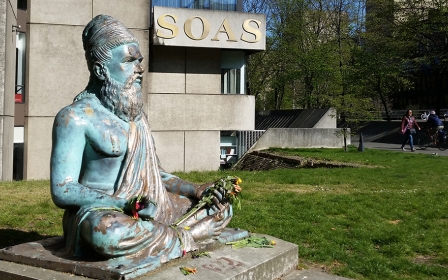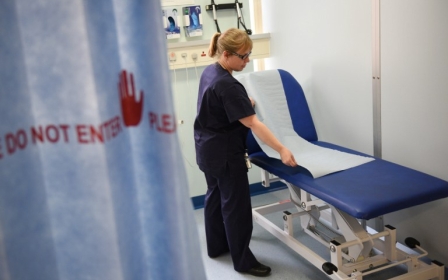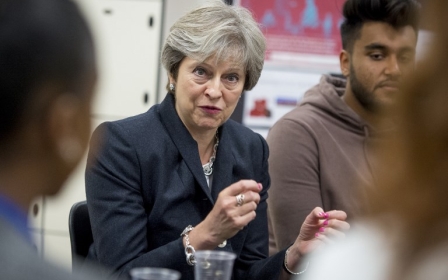NHS workers confuse 'interest in Middle East' with radicalisation: Report

Many UK public health workers do not feel that they could confidently tell the difference between someone with an interest in the Middle East and someone at risk of becoming a terrorist, according to a new report on the impact of the Prevent strategy in the healthcare sector.
A survey of 329 NHS staff, conducted by academics from Warwick University to assess the effectiveness of the government’s official Prevent training package. found that more than two-thirds of those surveyed had doubts that they could distinguish a political interest in the Middle East from radicalisation.
Asked whether they were confident that they could tell the difference between “someone experiencing radicalisation and someone with an interest in Middle Eastern politics and wars”, 56 percent of participants said they didn’t know, and 11 percent said they were unconfident they could.
Just one in three respondents said they had any confidence that they could make the distinction, the survey found.
The report, published on Monday, also cited examples of Prevent referrals within the NHS in which individuals were flagged up as causes for concern for reasons including watching an Arabic-language news channel and discussing a trip to Saudi Arabia to undertake the Hajj.
“On a home visit to a family, a healthcare professional noticed a child sitting in front of an Arabic televised news channel. There were also Arabic reading materials lying around. The family were reported to social care as a potential case of radicalisation,” the report said.
In another case, an “’Asian man’ was reported to the safeguarding team for discussing his future trip to Saudi Arabia. This had been interpreted by another healthcare professional as a cause for concern, rather than a trip to participate in the Hajj pilgrimage”.
The survey also found that 70 percent of staff would consider making a Prevent referral if they found that somebody owned books relating to “radical Islamic/anarchist philosophy”.
Other referrals were influenced by “gut thinking” and intuition, and “popular culture representations” of radicalisation such as watching beheading videos or expressing illiberal opinions, it found.
The report recommended that Prevent training should be amended to “instruct staff to beware of unconscious bias when making Prevent referrals. Currently there is a risk that popular culture stereotypes will influence staff perception of radicalisation”.
Since 2015, the Prevent Duty has required NHS staff, as well as other public sector workers including teachers and university lecturers, to “have due regard of the need to prevent people from being drawn into terrorism”.
An NHS Prevent training document published online in 2015 said that the healthcare sector was “one of the best-placed sectors to identify individuals who may be groomed in to terrorist activity”.
Staff must be able to recognise signs of radicalisation and be confident in referring individuals who can then receive support in the pre-criminal space,” the training document, which has since been taken offline, said.
Since then, hundreds of thousands of public sector staff have undertaken the government’s Workshop to Raise Awareness of Prevent (WRAP) training package.
But the Prevent strategy has been criticised by human rights watchdogs, parliamentary committees and Muslim community organisations amid concerns that it is discriminatory against Muslims and amounts to a form of surveillance.
About 65 percent of Prevent referrals between April 2015 and March 2016 were related to Islamic extremism, according to government figures, while Muslims make up just four percent of the UK population.
Concerns have also been raised in the healthcare sector about a conflict of interest between the Prevent duty and patient confidentiality.
'Blurring security operations and safeguarding'
The report said that communications between the Home Office, regional Prevent coordinators and NHS staff were "blurring the lines between security operations and safeguarding".
It cited an email sent by counter-terrorism police in Manchester in the aftermath of last May's bombing of a music venue in the city in which medical staff were urged to report patients who "identify themselves as being involved in or affected by the incident".
"After the Manchester Arena bombing of May 2017, safeguarding teams were instructed to notice patients who presented themselves as having been at the Arena and report them immediately to West Yorkshire Police. Safeguarding teams were exposed to communications which blurred the provision of healthcare with the detection of crime witnesses and terrorists," it said.
Briefings received by NHS safegurding staff from counter-terrorism units also included information about Kurdish activism and the "locations of mosques hosting meetings with suspected links to Hizb-ut-Tahrir", it said.
According to the report, less than half of healthcare workers surveyed felt that Prevent had a place in the NHS.
More than three-quarters of staff those who responded to the online questionnaire worked for an NHS trust in a "non-priority Prevent area" in central England, the report said.
The line between mental illness and radicalisation is becoming increasingly blurred
The report also highlights the burden imposed by the Prevent duty on mental health services, which, it said, accounted for two-thirds of referrals.
Four out of 54 mental health trusts in England had incorporated radicalisation screening into its risk assessment process for all patients, it said.
It also said that in some cases individuals appeared to have been referred to Prevent in order for them to gain “fast-track” access to mental health.
“The line between mental illness and radicalisation is becoming increasingly blurred,” the report said.
“The Prevent Duty should not act as a fast-track pathway to mental health care, or other social services, as this creates incentives for well-meaning practitioners to misuse Prevent to access services.”
Ben Wallace, the Home Office minister responsible for the Prevent Strategy, said: “Prevent is no more a surveillance scheme than the safeguarding schemes that have always been in place for healthcare workers to report signs of domestic or sexual abuse.
“We all have a duty to protect vulnerable people from being groomed by those who seek to exploit them for the purposes of sexual, criminal or extremist exploitation.”
New MEE newsletter: Jerusalem Dispatch
Sign up to get the latest insights and analysis on Israel-Palestine, alongside Turkey Unpacked and other MEE newsletters
Middle East Eye delivers independent and unrivalled coverage and analysis of the Middle East, North Africa and beyond. To learn more about republishing this content and the associated fees, please fill out this form. More about MEE can be found here.




